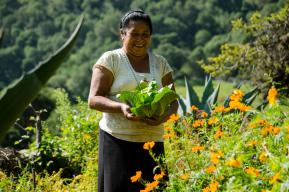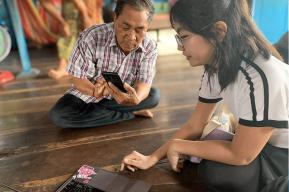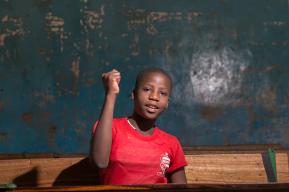News
Webinar 11 June 2020 - COVID-19 and Biodiversity Loss: Another Threat to Great Apes?

The IPBES Global Assessment Report on Biodiversity and Ecosystem Services published in 2019 demonstrated for the first time that human activity was responsible for the erosion of 75% of terrestrial ecosystems. Experts have been warning for decades, and even more so in recent months, that habitat fragmentation and human contact with wildlife are increasing the risk of diseases affecting wildlife in human populations. These threats to biodiversity and its natural habitats, by bringing species closer together, favour the emergence of zoonoses such as COVID-19 or Ebola fever, to which Africa has paid a heavy price. These diseases destroy human and animal lives. Our closest cousins, the great apes, are particularly vulnerable. With multiple factors already threatening them, could COVID19 sound the death knell for their existence?
This webinar, (in English), will take place on 11 June 2020 from 9h30 to 11h30 (UTC+2 - Paris time) the zoom platform.
A webinar in French took place on 3 June 2020.
Registration
Special Guest
 Jane Goodall, PhD, DBE, Founder - the Jane Goodall Institute & UN Messenger of Peace, is an ethologist renowned for her groundbreaking research into the wild chimpanzees of Gombe, now in its 60th year and part of the Gombe Masito Ugalla Biosphere reserve approved in 2018. The Jane Goodall Institute was founded in 1977 and Dr Goodall travels more than 300 days a year sharing stories about the programmes of the Jane Goodall Institute including the welfare of captive chimpanzees, community centred conservation and the global humanitarian and environment programme empowering young people, Roots & Shoots. She stresses that every day every action we take makes a difference and it is up to each one of us to decide what kind of difference we wish to make.
Jane Goodall, PhD, DBE, Founder - the Jane Goodall Institute & UN Messenger of Peace, is an ethologist renowned for her groundbreaking research into the wild chimpanzees of Gombe, now in its 60th year and part of the Gombe Masito Ugalla Biosphere reserve approved in 2018. The Jane Goodall Institute was founded in 1977 and Dr Goodall travels more than 300 days a year sharing stories about the programmes of the Jane Goodall Institute including the welfare of captive chimpanzees, community centred conservation and the global humanitarian and environment programme empowering young people, Roots & Shoots. She stresses that every day every action we take makes a difference and it is up to each one of us to decide what kind of difference we wish to make.
Panelists and Moderator
Sabrina Krief, French veterinarian and primatologist specialising in behavioural ecology and zoopharmacognosy in chimpanzees. For 16 years, she has been a member of the Eco anthropology and Ethnobiology team of the National Museum of Natural History where her research work focuses on chimpanzees, their health and the plants they eat. Since 2008, she has been working on the effects of human activities on the behaviour and ecology of chimpanzees. A professor at the National Museum of Natural History, Sabrina is Director of the Sebitoli Chimpanzee Project in Kibale National Park in Uganda, which has put in place preventive measures in the face of the COVID-19 epidemic.
Inza Koné is Full Professor of Conservation Biology at the Université Félix Houphouët-Boigny, Abidjan, Côte d’Ivoire. Since July 2018, he has been Managing Director of the Centre Suisse de Recherches Scientifiques en Côte d’Ivoire (CSRS). His work focuses on the management of natural resources and the conservation of large mammal species, particularly primates. This work makes the link between ecology, economy and culture for the empowerment of rural communities. Inza Koné has won several international and national awards, including a Presidential Award of the International Primatological Society in recognition of the services rendered to the said society and his leadership in primate research and conservation efforts in Africa. He has authored over 100 publications in the fields of primatology, conservation, behavioral ecology, and environmental education.
 Noëline Raondry Rakotoarisoa is a doctor in Plant Ecology. She is Head of the Biosphere Network and Capacity Building Section in the Division of Ecological and Earth Sciences and the focal point of the UNESCO Great Apes Survival Partnership. She was for more than 15 years a teacher-researcher in plant biology and ecology at the University of Mahajanga and the University of Antananarivo, Madagascar. From 1996 to 2000, she coordinated the projects of UNESCO's Man and the Biosphere (MAB) programme in Madagascar. She joined the United Nations in 2000 as Head of the Environment Unit of UNDP in Madagascar. She joined UNESCO in January 2004 where she served successively in the Dakar and Nairobi Regional Offices.
Noëline Raondry Rakotoarisoa is a doctor in Plant Ecology. She is Head of the Biosphere Network and Capacity Building Section in the Division of Ecological and Earth Sciences and the focal point of the UNESCO Great Apes Survival Partnership. She was for more than 15 years a teacher-researcher in plant biology and ecology at the University of Mahajanga and the University of Antananarivo, Madagascar. From 1996 to 2000, she coordinated the projects of UNESCO's Man and the Biosphere (MAB) programme in Madagascar. She joined the United Nations in 2000 as Head of the Environment Unit of UNDP in Madagascar. She joined UNESCO in January 2004 where she served successively in the Dakar and Nairobi Regional Offices.
 Anton Nurcahyo is the Deputy CEO of the Borneo Orangutan Survival Foundation. His career has been dedicated to the conservation and the survival of orangutans. He served as the Nature Conservancy’s Orangutan Action Plan Coordinator between 2008 and 2010 before joining the Borneo Orangutan Survival Foundation’s Central Kalimantan Orangutan Reintroduction Project as Program Manager. Between 2013 and 2019, he worked on his PhD on “Geographic Varieties through Morphological Assessment in the Orangutan, and Implications for the Conservation Program.” He is part of the IUCN Species Survival Commission, Great Ape Section Committee and the International Primatological Society. Anton has contributed to the production of several scientific journals including the taxonomic determination of the third orangutan species, Pongo tapanuliensis.
Anton Nurcahyo is the Deputy CEO of the Borneo Orangutan Survival Foundation. His career has been dedicated to the conservation and the survival of orangutans. He served as the Nature Conservancy’s Orangutan Action Plan Coordinator between 2008 and 2010 before joining the Borneo Orangutan Survival Foundation’s Central Kalimantan Orangutan Reintroduction Project as Program Manager. Between 2013 and 2019, he worked on his PhD on “Geographic Varieties through Morphological Assessment in the Orangutan, and Implications for the Conservation Program.” He is part of the IUCN Species Survival Commission, Great Ape Section Committee and the International Primatological Society. Anton has contributed to the production of several scientific journals including the taxonomic determination of the third orangutan species, Pongo tapanuliensis.
 Enny Sudarmonowati (Prof. Dr.) is the current Chair of the Man and Biosphere Programme International Coordinating Council. She was Chairperson of Indonesia National Committee of Man and Biosphere UNESCO and was Deputy Chair for Life Sciences of Indonesian Institute of Sciences (LIPI) in 2014-2019. She specialises in biological sciences (obtained a Ph.D degree in 1991 from Bath University, UK then as a Professor in Research Centre for Biotechnology LIPI in 2010) including advanced biotechnology with a focus on forestry and agriculture for species and ecosystem improvement, sustainable use and conservation. She has also been focusing on multi disciplines aspects by integrating sustainable science for community development, poverty eradication, and sanitation to support SDGs since her engagement as an environment activist joining an international NGO in 1996 as well as one of the founders of a local environment and conservation NGO.
Enny Sudarmonowati (Prof. Dr.) is the current Chair of the Man and Biosphere Programme International Coordinating Council. She was Chairperson of Indonesia National Committee of Man and Biosphere UNESCO and was Deputy Chair for Life Sciences of Indonesian Institute of Sciences (LIPI) in 2014-2019. She specialises in biological sciences (obtained a Ph.D degree in 1991 from Bath University, UK then as a Professor in Research Centre for Biotechnology LIPI in 2010) including advanced biotechnology with a focus on forestry and agriculture for species and ecosystem improvement, sustainable use and conservation. She has also been focusing on multi disciplines aspects by integrating sustainable science for community development, poverty eradication, and sanitation to support SDGs since her engagement as an environment activist joining an international NGO in 1996 as well as one of the founders of a local environment and conservation NGO.










